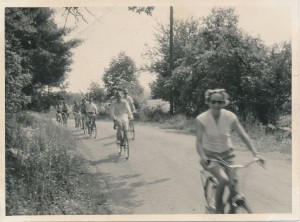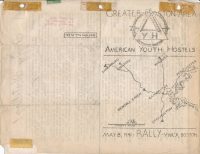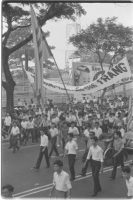
The exhibition includes two wall displays. Pictured here, attendees at the exhibition’s opening reception view mounted translations of Zen poems from early Vietnam.
Earlier this summer, University Archives & Special Collections worked with staff from the William Joiner Institute for the Study of War and Social Consequences at UMass Boston on an exhibition celebrating the thirty-year history of the Institute’s Writers’ Workshop.
The display, in the Walter Grossmann Memorial Gallery in the Healey Library, includes a range of materials related to the Writers’ Workshop, as well as archival materials, photographs, and artwork from the Archives’ Joiner Institute collections.
This year’s Writers’ Workshop Festival and Celebration, which was held in June, “celebrated 30 years of community and creative responses to war” and continued the Institute’s “tradition of focusing on the intersections of writing, war, social justice, and peace making.” In this exhibit, we look back on the history of the Writers’ Workshop, as well as the wide range of accomplishments and activities of the Joiner Institute since it was established in 1982. Additionally, this display features materials from a number of archival collections in University Archives & Special Collections that document the history of the Vietnam War (many materials were originally collected by or in collaboration with the Joiner Institute).







This display was organized in close collaboration with the Joiner Institute.
University Archives & Special Collections has curatorial responsibility for material acquired by the William Joiner Institute (formerly the William Joiner Center) as part of its mission to study the effects of the Vietnam War on our society, as well as the study of war and social consequences more broadly. The collections of archives, manuscripts, photographs, and videos primarily explore veterans’ issues and experiences.
Explore the Joiner Center/Institute collections and collections related to war and social consequences. For a guide to researching the Vietnam War, click here.
Visit the display in the Grossmann Gallery on the 5th floor of the Healey Library at UMass Boston. The exhibition will run through the fall of 2017.
For questions about the exhibition and these collections, or to schedule a research appointment, please contact library.archives@umb.edu or 617-287-5469.
University Archives & Special Collections in the Joseph P. Healey Library at UMass Boston collects materials related to the university’s history, as well as materials that reflect the institution’s urban mission and strong support of community service, notably in collections of records of urban planning, social welfare, social action, alternative movements, community organizations, and local history related to neighboring communities.
University Archives & Special Collections welcomes inquiries from individuals, organizations, and businesses interested in donating materials of an archival nature that that fit within our collecting policy. These include manuscripts, documents, organizational archives, collections of photographs, unique publications, and audio and video media. For more information about donating to University Archives & Special Collections, click here or email library.archives@umb.edu.







